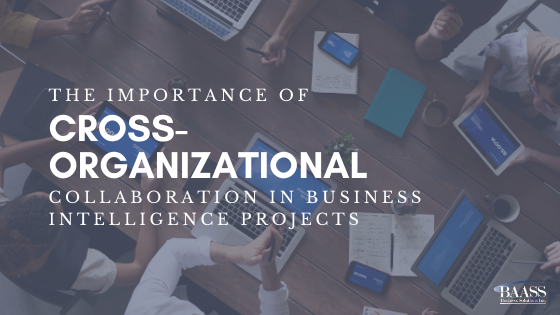
When you’re starting a business intelligence project, certain departments within your company may seem essential to the project’s success. Some departments immediately come to mind as key players in the creation and execution of the project’s deliverables. But the importance of cross-organizational collaboration cannot be underestimated.
Many business intelligence projects get off to a rocky start not because of lack of effort, but simply because the right people aren’t at the table working together on the project from the start. In many organizations, participation in major projects is limited to the key stakeholders who benefit immediately from the project. With business intelligence projects, however, nearly everyone benefits, and nearly everyone in the organization uses the system. Their input into the project from its inception is essential for both its success and the usefulness it brings to the organization.
The Sales and Marketing Perspective
Two groups that are often overlooked in the planning process are sales and marketing. Yet these two groups, perhaps more so than any others, have their fingers on the pulse of customer needs. It is customers who should drive business decisions rather than manufacturing, finance or operations. Customer wants, needs and desires are what drives your business. Having the people at the table who interact directly with your customers, and who understand them the best, is important.
Sales and marketing can help you begin your business intelligence project with a ‘customer-first’ mindset. In this scenario, you will think first about the business intelligence derived from the database that influences customer service, orders and other business segments that provide immediate customer benefit. By starting first and foremost with the customer, you’ll start with the most important success-drivers in mind.
Increasing Support for Decisions
Next, think about who will benefit from having accurate, timely and clear data to make important decisions. These are the people internally who benefit from access to the business intelligence system and who may have specific questions that data can answer. Starting with their needs, the team developing the project requirements for your business intelligence system can gain a clearer picture of how to map end results back to inputs to ensure everything is accounted for during the development of the business intelligence system.
Sponsors and Champions at the Table
Look around your organization. Do you have sponsors or project champions among the executive team who are agitating for a business intelligence system? If you do, be sure to include them in your discussions and planning sessions. They may not attend every session, but those they do will whet their appetite for more.
Many high-level and cross-organizational projects like business intelligence systems rely upon such internal champions to ensure adequate funding, resources, and time are behind the project. Court your champions, and make sure to keep them in the picture when discussion the project. They need to see their work unfold and come to fruition.
Blog: BAASS' Buyer Guide - Business Intelligence
Get Your BI Project Off to a Good Start with BAASS Business Solutions, Inc.
At BAASS, we provide expert insights and guidance to help your projects succeed. We listen to your business challenges and design solutions to help you overcome these challenges. Whether it’s business intelligence data, HR, ERP, accounting, or other needs, we can help. Contact us or call 1-888-650-5544.
